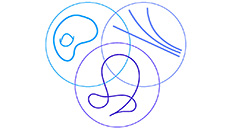Cobordism categories
Masterclass: Building bridges between algebra and geometry
University of Copenhagen, 17-21 February 2025
The masterclass will take place at Statens Naturhistoriske Museum, Øster Voldgade 5 – 7, 1350 København K.
This masterclass aims to showcase different perspectives of the cobordism categories. The lecture series will explore the interface of cobordism categories, modular ∞-operads, (equivariant) topological modular forms, topological quantum field theories, and Hopf algebras.
- David Reutter (University of Hamburg): Hopf algebras in bordism categories and the homotopy quantum groups of a topological field theory
- Jan Steinebrunner (Cambridge University), 2-dimensional TFTs via modular ∞-operad.
- Mayuko Yamashita (University of Kyoto), Topological modular forms, its equivariant refinements and supersymmetric quantum field theories
Lecture series:
Jan Steinebrunner: 2-dimensional TFTs via modular ∞-operad
Abstract: 2-dimensional topological field theories (2D TFTs) valued in vector spaces are commutative Frobenius algebras. The goal of this lecture series is to generalise from the 1-category of vector spaces to any symmetric monoidal ∞-category C, i.e. to study symmetric monoidal functors Bord2 --> C . Choosing C to be the (2, 1)-category of linear categories, this recovers a definition of modular functors, and choosing it to be the derived category of a ring yields a notion closely related to cohomological field theories.
I will introduce a notion of modular ∞-operads and algebras over them, construct the modular ∞-operad of surfaces M, and show that algebras over M in C are exactly 2D TFTs valued in C. Along the way we will encounter variants modular ∞-operads (such as cyclic ∞-operads and ∞-properads) as well as a proof of the 1D cobordism hypothesis with singularities. This uses some (mild) ∞-category theory, but no familiarity with (∞-)operads will be assumed.
The main goal will be to filter M by genus to obtain an obstruction-theoretic description of 2D TFTs with general target. Applying this to invertible TFTs one can construct a new spectral sequence exhibiting relations between the cohomology groups of moduli spaces of curves.
Mayuko Yamashita: Topological modular forms, its equivariant refinements and supersymmetric quantum field theories
Abstract: This lecture is about the recent developments on the Segal-Stolz-Teichner proposal. This proposal relates 2-dimensional N=(0, 1) supersymmetric quantum field theories and elliptic cohomology theories. Moreover there are important refinements of the original statements taking symmetries of field theories into account. The classifying objects for such field theories are expected to be equivariant elliptic cohomology and more generally to be "categorical equivariant elliptic cohomology" which is yet to be constructed mathematically.
To appear
The conference/masterclass will take place at the Department of Mathematical Sciences, University of Copenhagen. See detailed instructions on how to reach Copenhagen and the conference venue.
Tickets and passes for public transportation can be bought at the Copenhagen Airport and every train or metro station. You can find the DSB ticket office on your right-hand side as soon as you come out of the arrival area of the airport. DSB has an agreement with 7-Eleven, so many of their shops double as selling points for public transportation.
A journey planner in English is available.
More information on the "find us" webpage.
We kindly ask the participants to arrange their own accommodation.
We recommend Hotel 9 Små Hjem, which is pleasant and inexpensive and offers rooms with a kitchen. Other inexpensive alternatives are Steel House Copenhagen (close to city centre), and CabInn, which has several locations in Copenhagen: the Hotel City (close to Tivoli), Hotel Scandinavia (Frederiksberg, close to the lakes), and Hotel Express (Frederiksberg) are the most convenient locations; the latter two are 2.5-3 km from the math department. Somewhat more expensive – and still recommended – options are Hotel Nora and Ibsen's Hotel.
An additional option is to combine a stay at the CabInn Metro Hotel with a pass for Copenhagen public transportation (efficient and reliable). See information about tickets & prices.
Please fill out the registration form here by Jan 20, 2025.
The deadline for requesting funding has passed.
Organisers: Jonathan Clivio, Branko Juran, Fadi Mezher, Azélie Picot, Nathalie Wahl, Adela Zhang
For inquiries, please contact Branko Juran <bj@math.ku.dk> and Adela Zhang <yz@math.ku.dk>.

